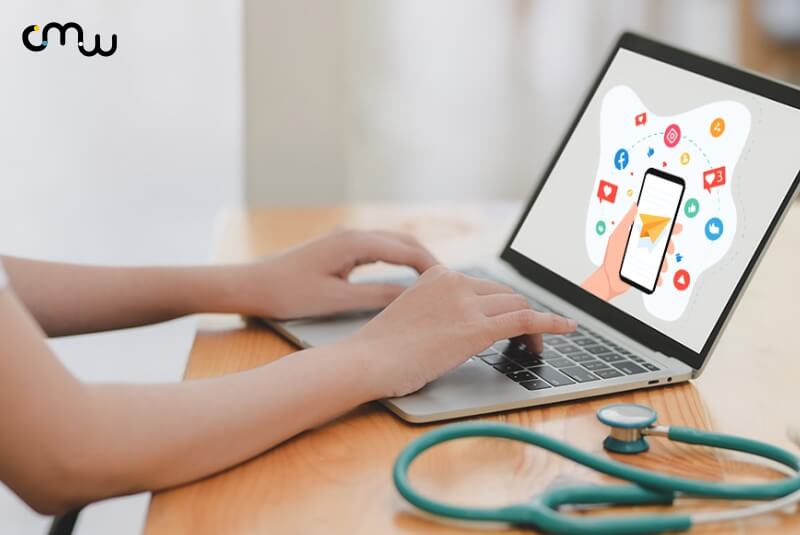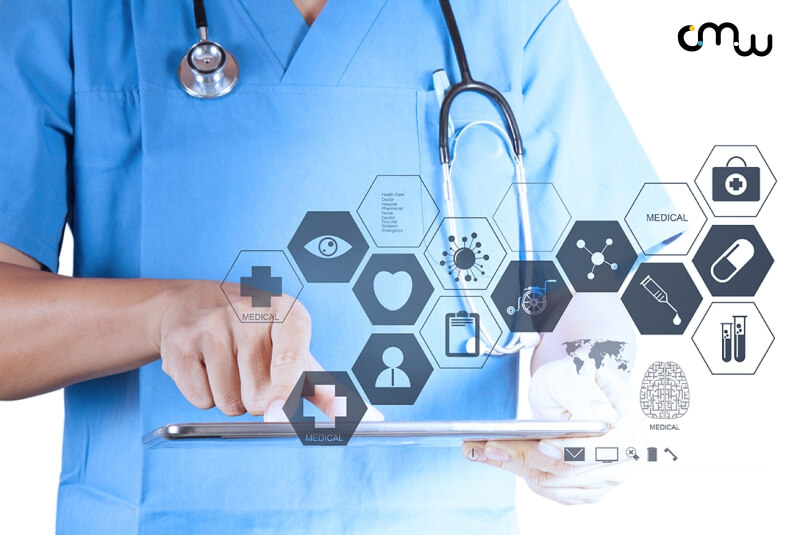Healthcare during COVID-19 is a critical topic since the individuals faced several mental and physical health issues resulting from healthcare facility lockdown procedures. Hospitals were gradually coming up with online methods, but the change required was immediate and quick. The outbreak of the COVID-19 pandemic implies that most of us are lodging at home and doing less in terms of communal interplay and exertion. It can injure your bodily and psychological health. Crisis rooms are well over capacity, and there are dreadful scarcities of obligatory preservative articles for healthcare employees. Doctors in New York City, the core of America's coronavirus catastrophe, are alerting that individuals need to take care to conserve; some people may die because there are not enough assets to aid one and all. It's not an adequate scheme to go to the doctor or hospital besides you have to, which is why telemedicine systems—browsers, apps, and other systems drafted to tie us up with medical professionals—have become analytic why you should know how to use them.
Need for online healthcare
Researchers swiftly endorsed that hospitals and health clinics contemplate poising up telemedicine amenities towards the beginning of the pandemic, knowing that a virtual consultation was the minimal perilous, most efficient way to furnish non-emergency care amid the turmoil to come. By staying home, you curb your possibilities of spreading the virus—or, if you only have light indications, of escalating it further. That minimizes the load on emergency rooms, which need to emphasize high-risk instances, which include COVID-19 but also the usual: car mishaps, strokes, and heart attacks. It is why the healthcare industry during COVID-19 focused on telehealth and telemedicine. They also did so to abide by the safety precautions and increase healthcare access during COVID-19.
Deliberations like these are fruitful during the COVID-19 pandemic. The virus bestows indications akin to cold, seasonal flu, or bad allergies like fever, cough, exhaustion, body pain, pharyngitis, and diarrhea. Telemedicine is a significant way to interrupt a pattern that's popular with emergency physicians. Patients think they might have the indications of COVID-19 but withstand seeking advice from a doctor if it's not coronavirus. They watch the headlines, freak out, and worry they're going to die either way.
It's safe to say that most executives associated with healthcare understand the significance of a well-founded web presence in engaging new patients and holding onto existing ones. In particular, the internet and search have modified the patient path to treatment, empowering healthcare consumers to conduct their research and make their own decisions when seeking out treatment options.
Steps to attain online healthcare
Rather than navigating to the medical center, you'll visit your favored hospital's website and file in a telemedicine portal. You can also google the hospital name and do the necessary. Patients under lockdown and health workers are in fear of contamination. In the face of an increase in cases of COVID-19, physicians and health systems globally are hurrying to embrace virtualized treatment methods that preclude the need for physical gatherings between patients and health providers. Also, many doctors are working cautiously.
You can use bilateral applications with audio and video proficiencies to visit doctors for an even broader scope of amenities during known robust emergencies. Providers also can appraise recipients who have audio phones only. These interim mutations will guarantee that patients can access physicians and other providers while remaining safely at home. With mobile phone use now universally omnipresent, technological hindrances to adopting online health care are easily passable, even in the most resource-scarce backdrops.
Doctors will tell us to turn on your computer's webcam, which most medical practitioners say is exemplary. But if the video isn't an alternative, make sure you take the latest photo of something the doctor may need to see, which may be an injury or anything else. Then, doctors will generally ask us the identical interrogation you would be during a drill check-up: allergies, former medical context, how long your symptoms have materialized, and so on.
One distinct encouraging side stream of telemedicine is psychological healthcare. It could be as elementary as switching a subsisting patient from personal visits to video conferences. Still, there have been some quick solutions, counting Betterhelp, MDLive, or the more esoteric services like Regain for couples therapy or Pride Counseling for LGBTQ people.
Alternative procedures
People may also have a different outlook, which might, in turn, put decreased pressure on the healthcare sector during COVID-19. A few suggestive measures include:
Staying physically active: You can do 3-4 minutes of light potent bodily movement, like walking or stretching, which will simplify your muscles and enhance blood circulation and muscle activity. Regular physical activity is advantageous to both the body and mind. It can minimize hypertension, and narrow the risk of cardiovascular diseases, stroke, type 2 diabetes, and some cancers - all situations that can surge vulnerability to COVID-19. It also increases bone and muscle strength and increases stability, pliability, and athleticism.
Intaking healthy food: While nutritional starvation cannot prevent or cure COVID-19 infection, healthy nourishment is necessary for subsidizing immune systems. Adequate nutrition can also decrease the likelihood of developing other bodily problems, including adiposity, heart disease, diabetes, and some types of cancer. Eat a variety of food, including fruits and vegetables. You need to avoid excessive salt and stay hydrated and limit sugar intake.
Looking after mental health: It will take time to habituate to the current work from home, interim unemployment, home-schooling of youngsters, and lack of physical contiguity with other family members and friends. Modification to lifestyle changes, controlling the fear of contracting the deadly virus, and worrying about people near us who are at higher risk are testing for all of us. They can be incredibly strenuous for people with mental health conditions.
Outcome
Integrally, telemedicine's boom is likely to transcribe to an enduring change for both doctors and their patients—mainly because it eradicates many hurdles to care that typically prevent people from participating. Telemedicine has provided a revitalizing outlook into how medical fraternities approach the standard of care—great scrutiny considering the enormous number of people needing backing. Hence, this is how healthcare during COVID-19 is maintained.
















